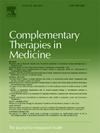正念冥想对血液透析期间溶性高血压患者血压和生活质量的影响:一项随机对照试验。
IF 3.5
3区 医学
Q1 INTEGRATIVE & COMPLEMENTARY MEDICINE
引用次数: 0
摘要
目的:探讨正念冥想对透析期高血压(IDH)患者血压变化及生活质量的影响。方法:这项单盲、随机对照试验于2024年8月至12月在中国浙江省宁波市丽丽丽医院接受维持性血液透析的69例IDH患者进行。患者被随机分配到接受正念冥想的干预组(n = 34)和接受标准治疗的对照组(n = 35)。在基线和12周后测量血压和生活质量。结果:在血液透析过程中,干预组患者的收缩压、舒张压、平均动脉压及脉搏率均显著低于对照组(p < 0.001)。使用肾脏疾病生活质量短表36评估,干预组的生活质量在多个维度上都有显著改善,包括身体功能、身体问题导致的角色限制、身体疼痛、一般健康、精力/疲劳、情绪健康和睡眠(p < 0.05)。然而,社会功能无明显改善(p < 0.05)。实验室检测显示干预组血清同型半胱氨酸水平显著降低(p < 0.05)。干预组不良反应发生率(11.76%)明显低于对照组(45.71%),p < 0.05。结论:正念冥想能有效改善血液透析患者的IDH,显著提高患者的生活质量。正念冥想作为一种非药物干预,安全易行,为IDH患者提供了一种新的治疗选择。试验注册号:ISRCTN82788940,注册日期:29/10/2024。本文章由计算机程序翻译,如有差异,请以英文原文为准。
Effects of mindfulness meditation on blood pressure and quality of life in patients with intradialytic hypertension during haemodialysis: A randomised controlled trial
Objective
To investigate the effects of mindfulness meditation on blood pressure changes and quality of life in patients with intradialytic hypertension (IDH) during haemodialysis.
Methods
This single-blind, randomised controlled trial involved 69 patients with IDH undergoing maintenance haemodialysis at Lihuili Hospital in Ningbo, Zhejiang Province, China, between August and December 2024. Patients were randomly assigned to an intervention group (n = 34) receiving mindfulness meditation and a control group (n = 35) receiving standard care. Blood pressure and quality of life were measured at baseline and after 12 weeks.
Results
During haemodialysis, the intervention group exhibited significantly lower systolic, diastolic and mean arterial pressures, as well as pulse rate, than the control group (p < 0.001). Quality of life, assessed using the Kidney Disease Quality of Life Short Form 36, improved significantly in the intervention group across multiple dimensions, including physical function, role limitations due to physical problems, bodily pain, general health, energy/fatigue, emotional well-being and sleep (p < 0.05). However, no significant improvement was observed in social function (p > 0.05). Laboratory tests showed a significant reduction in serum homocysteine levels in the intervention group (p < 0.05). The incidence of adverse reactions was significantly lower in the intervention group (11.76 %) than in the control group (45.71 %, p < 0.05).
Conclusion
Mindfulness meditation can effectively improve IDH in patients undergoing haemodialysis and substantially enhance their quality of life. As a non-pharmacological intervention, mindfulness meditation is safe and easy to implement, offering a new therapeutic option for patients with IDH.
Trial Registration
ISRCTN82788940, Registration date: 29/10/2024
求助全文
通过发布文献求助,成功后即可免费获取论文全文。
去求助
来源期刊

Complementary therapies in medicine
医学-全科医学与补充医学
CiteScore
8.60
自引率
2.80%
发文量
101
审稿时长
112 days
期刊介绍:
Complementary Therapies in Medicine is an international, peer-reviewed journal that has considerable appeal to anyone who seeks objective and critical information on complementary therapies or who wishes to deepen their understanding of these approaches. It will be of particular interest to healthcare practitioners including family practitioners, complementary therapists, nurses, and physiotherapists; to academics including social scientists and CAM researchers; to healthcare managers; and to patients. Complementary Therapies in Medicine aims to publish valid, relevant and rigorous research and serious discussion articles with the main purpose of improving healthcare.
 求助内容:
求助内容: 应助结果提醒方式:
应助结果提醒方式:


